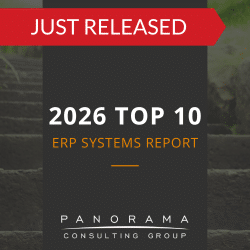A customer relationship management (CRM) system can give your company the ultimate competitive advantage. When you have client records, account histories, and other relevant data at your fingertips, it’s easier to provide the customized support that modern consumers crave.
Before you can recognize these benefits, however, the software implementation must go smoothly.
There are several CRM implementation risks that can threaten to derail your efforts. Today, we’re looking at some of the most common issues that could occur and how to avoid them.
5 Overlooked CRM Implementation Risks
1. Lack of Buy-In
From CRM software to ERP software to SCM software, any type of enterprise system requires buy-in from your C-suite. In addition, you must encourage active support from all departments, including middle management and department leads.
We recommend empowering executive leaders to take an active role in supporting the CRM implementation. It’s easier to get other employees on board when executives are leading by example.
Before getting too far into your CRM project, make sure all your company-wide influencers and leaders are prepared to champion the project.
The 2026 Top 10 ERP Systems Report
What vendors are you considering for your ERP implementation? This list is a helpful starting point.
2. Poorly Defined Goals and Strategy
To ensure your CRM project meets your expectations, you must begin by clearly defining the benefits you expect it to deliver. While this step might seem obvious, many organizations skip it in their rush to get the software live.
While each company has its own reasons for investing in a CRM solution, some of the most common measurable goals include:
- Increasing average revenue per sale
- Attracting more leads
- Improving customer satisfaction and retention rates
- Improving sales forecasting accuracy
- Lowering customer acquisition costs
- Achieving higher sales close rates
Your business goals will direct the specific type of CRM solution you select. If you’re finding it difficult to pinpoint goals, you may need to rethink your project strategy. Ask your team exactly what problems they’re trying to solve so you know how to define success.
3. Failing to Acknowledge Risks
Even the best-laid plans can go sideways when companies assume that their project is fail-proof.
As your project ramps up, take the time to think of the most critical problems you might face. Here are some potential issues you might include in your CRM risk analysis:
- Going over the budget
- Going over the schedule
- Selecting a CRM solution that doesn’t address your highest-priority business needs
- Selecting a CRM solution that doesn’t integrate with your existing business systems
When any of these issues occur, they could catalyze a domino effect that leads to CRM failure.
By identifying risks up front, you can put steps in place to reduce the likelihood of their occurrence and minimize their effects.
4. Selecting the Wrong Solution
At the very least, the CRM system you select should meet these criteria:
- Ability to integrate with your existing systems and those you might implement in the future
- Scalability to grow with your organization
- A justifiable total cost of ownership
You also need to make sure the solution performs the necessary functions to meet your business goals.
For instance, it should facilitate seamless communication between employees and clients. It should also streamline data management and segment customers by account for easy access and retrieval.
5. Little Emphasis on OCM
A CRM implementation includes both technical and human aspects. Over-emphasizing the technical aspect could leave your employees feeling unsupported.
By focusing on organizational change management (OCM), you can minimize resistance, reduce downtime, and give your team members the skills they need to embrace the new solution.
A lack of OCM is something our software expert witnesses see on a regular basis. In fact, Bill Baumann will tell you he sees it in almost every case.
So . . . we recommend actively involving end-users from the beginning, incorporating their knowledge and feedback into the baseline system design. Involve them in requirements gathering sessions, and then show them prototypes so they can tell you what needs to change.
Once everything is up and running, check in frequently to learn about any pain points they may be experiencing.
Keep Your CRM Implementation on Track
Any type of digital transformation involves both risks and rewards. Instead of overlooking potential potholes, it’s important to anticipate them as early as possible. Then, you can put measures in place to reroute and optimize your efforts.
The right enterprise software consultant can help you avoid CRM implementation risks. From initial planning to post-live support, we’re here for it all. Request a free consultation below.














